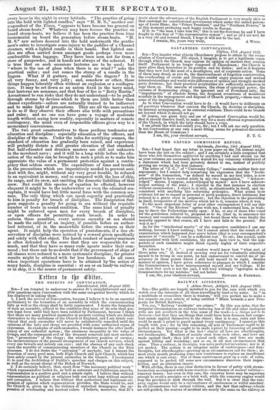Ittttro to tbt Cahn.
THE OBJECTS OF CONVOCATION.
.Llandrinded, 16th August 1852.
am tempted to endeavour to answer D.'s straightforward and sen- sible 9nestions upon Convocation with the same categorical brevity which he has displayed in asking them.
1. I seek the revival of Convocation, because I believe it to be an essential preliminary to the formation of an assembly in which the communicating laity as well as the clergy shall be fairly represented. I desire the formation of such an assembly., subject to the condition that none of its acts shall pos- sess legal force until they have been ratified by Parliament, because I think that there are many practical anomalies at present existing which are fatally obstructive to the usefulness of the Church of England, and I am firmly con- vinced that such anomalies will never be satisfactorily remedied until the opinions of the laity and clergy are provided with some authorized organ of expression. As examples of such anomalies, I would instance the utter ineffi- ciency of our cathedral system ; the enormous inequality in the value of living!, and the consequent evil of the frequent removals and most unchris- tian promotions" of the clergy ; the unsatisfactory position of curates ; the inconveniences of the present arrangement of our church services, which every one bewails and nobody can cure ; and the absence of any such check upon the morality of communicating members of the Church as the Kirk possesses. I do not desire the "extrusion" of anybody, but I lament the desertion of many good men, both High Church and Low Church, which has been solely caused by the present anomalies in the Church. I recommend , D. to read the Archbishop of Dublin's speeches and charges on this subject, as well as the recent charge of the Bishop of Norwich.
2. I do certainly believe, that, apart from "the necessary political work" j which representative bodies do as well as autocrats and Californian anarchs, representation is a positive good and a simple right. I believe that without , representation no political or religious body can exist long without anarchy ' and corruption. I believe that without that authorized and legitimate ex- j pression of opinion which representation provides, the State would be, and the Church is, given up to the violence of oratorical demagogues the op- J premien of overbearing and insolent rulers. I believe, moreover, that D.'s doubt about the advantages of the English Parliament is very nearly akin to that contempt for constitutional government which under the united patron- age of Louis Blanc, the "Prince President," and the "Northern Powers," is at this moment producing such happy results in Europe.
If D. be "the man I take him for," this is not the first time he and I have fought in this fray of "the representative system" ; and as (if I err not) 118 is a very old and revered friend, I hope it will not be the last.


























 Previous page
Previous page